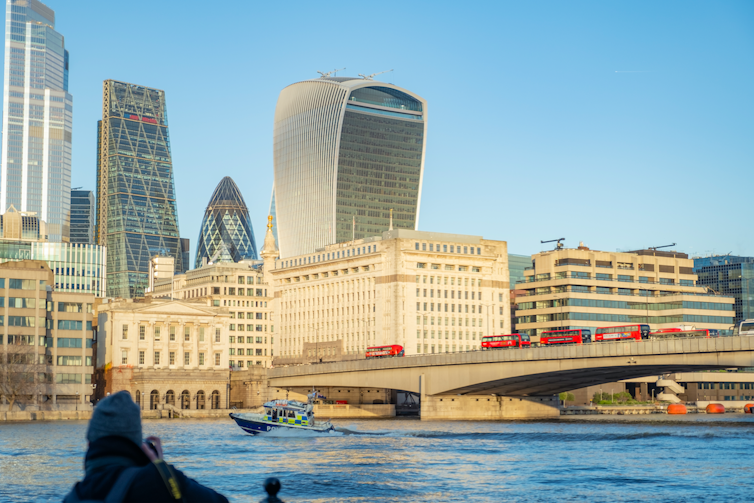Alasdair Booth, Loughborough University
Most parts of the UK are now living in a state of some form of lockdown. Meanwhile, however, more police are out on the streets. This is because in the wake of the terrorist attacks in Austria and France, the UK’s terrorism threat level has been raised to “severe”.

In Vienna, a man reported to be a sympathiser of the proclaimed Islamic State group, opened fire with an automatic rifle in a city street, killing four and seriously injuring several more.
This came shortly after two other attacks in France. In Nice two people were killed and, in Paris, a teacher was targeted at the end of October. At the time of these attacks, the UK terrorism threat level was set at “substantial” – meaning that an attack was likely. The threat has been at this level since November 2019.
The timing of the attack in Vienna was significant. It was the night before Austria was due to go into a period of lockdown to manage the spread of COVID-19. It meant the city centre would be busy as people enjoyed a final night out before restrictions came into force. Busy public spaces have been targets in multiple other attacks in recent years in France, Germany and the UK.
Why was the threat level raised?
In response to these events in Vienna, Nice and Paris, the Joint Terrorism Analysis Centre (JTAC), part of MI5, upgraded the UK’s terrorism threat level to “severe”. The increased threat level came immediately in response to the Vienna terrorist attack, and indicates that an attack in the UK is considered highly likely.
The UK government has been keen to stress that despite the change in threat level, there was no specific intelligence to suggest that an attack on the UK or UK interests overseas was imminent. Home secretary Priti Patel has said people should be “alert but not alarmed” and that the increase in the country’s threat level was a “precautionary measure”.
Decisions on the terrorism threat level take into consideration a number of factors. These include what intelligence is available at the time and what security authorities already know about things like what resources terrorist suspects might have available and what motivations they might have for carrying out an attack, irrespective of ideology.
Assessing the terrorism threat involves continuously monitoring world events so it was almost inevitable that the UK government would raise its terrorism threat level after what happened in Austria and France. Terrorist groups will have considered these attacks a success so there would naturally be concerns that they might seek to replicate the attacks in the UK.
What happens now?
It is likely there will be changes to security arrangements across the UK now that the threat level been raised. There is likely to be an increase in visible policing, particularly in public spaces and crowded places. Expect to see more police in locations considered to be symbolic or iconic, since these are considered more desirable targets for attackers. That might mean places of worship, major shopping centres, sports stadiums and visitor attractions.
Usually these venues are heavily populated, which can lead to a high number of casualties if attacked, and they are often considered to be soft targets due to having limited protective security measures making them vulnerable. Some targets may be considered to be symbolic if they represent a culture, corporation or government that a terrorist wants to attack.
Given the attack in Vienna involved the use of an automatic firearm, and the attacks in Nice and Paris involved bladed weapons, it is feasible that visible patrols in some areas of the UK could be carried out by police firearms officers to help increase the UK’s preparedness to deal with a similar style attack.
This also acts as a visual deterrent and a reassurance to the public. Overt police armed patrols were used in the UK in response to the terrorist attacks in Paris in 2015, for example.
There will also be more security messages and announcements over public address systems in crowded places, such as transport hubs and crowded places. This is meant to increase vigilance and encourage people to report suspicious packages or activity.
The UK Counter Terrorism Policing network will deploy its security message of “run, hide and tell” which provides advice on what the public should do if caught up in a firearms and weapons attack. This too, reflects the nature of the attacks in Austria and France.
The National Counter Terrorism Security Office (NaCTSO) and the Centre of the Protection of National Infrastructure (CPNI) have specialist security advisers who work with businesses considered to be at risk of being targeted by terrorists, and provide protective security advice to them. The heightened security level is likely to see an increase in engagement between them.
Many public spaces and crowded places are likely to be quieter, with less visitors due to non-essential businesses being closed for lockdown. That reduces opportunities for terrorists to carry out attacks. But the UK government still clearly considers there to be an ongoing terrorist threat to the UK and the public will need to remain vigilant.
Alasdair Booth, Visiting Fellow in Counter-Terrorism Protective Security and the Built Environment, Loughborough University
This article is republished from The Conversation under a Creative Commons license. Read the original article.












